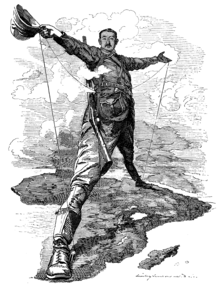Below, a picture of Clayton from Disney's Tarzan, portrays a man who's "interest" in Tarzan and the gorilla's is feigned to hide his true intent of stealing resources from the rain forest Tarzan and his friends call home.
| Political Cartoon depicting the"White Man's Burden" |
The fight for political and territorial domination began in 1875. Prior to 1875, Queen Elizabeth had a relationship built on mutual respect with the Moguls and Napoleon forged "equality" with Persia. But as their demand grew larger, they needed new territories for their resources. The industrial revolution was both a push and pull factor for imperialism, creating the need and the ability to expand. They now had the means of travelling far and wide, fast and cheap, and could transport their goods the same way. And they need these foreign lands to fuel the supply and demand back home. European became accustomed to low prices and cushy life styles.
Other incentives and motives include the spread of Christianity through missionaries, the necessity for new resources that were not needed in the past. Industrialization led to a need for new markets, which colonies provided. These new markets allowed for rapid development to occur in these colonies and civilized control of these countries. Competition became strong as countries raised tariffs to keep up and stay ahead of the rest.
The three forms of control (descending order of how much power the European Nation had of a territory):
1. Colony
2. Protectorate
3. Spheres of Influence
Scramble
Among others, some of the biggest territories claimed include: Belgium holding Congo, France holding claimed West Africa, the "French" Congo and Madagascar, Great Britain snagging Egypt, Gibraltar, Nigeria, Rhodesia, Suez Canal, South Africa and Sudan in a mission to capture "Cape to Cairo," Germany held East Africa and parts of Southwest Africa, and Italy held claim to Somalia, Libya and tried to take Ethiopia, but failed and Ethiopia remained autonomous.
 |
| "Cape to Cairo" and Cecil Rhodes, led the project - he was a pioneer in British expansion in Africa. |
Pictured below is a map of what European powers colonized which territories in Africa.

As shown above, almost all of Africa was occupied and being used for it's resources by a European Nation. But getting to this map was not as simple. There were conflicts were desired territories overlapped and which form of control should be had in a colony, so naturally, fighting did occur.
Early conflicts, before Africa:
Other conflicts that resulted from Imperialism include Opium wars, Sepoy and rivalries.
In 1839, the first Opium war was the result of China's frustration with Britain trading the highly addictive drug Opium, for tea. This war resulted in Britain confiscating the Hong Kong Island.
In 1857, a mutiny of Sepoys led to the eventual end of the East India Company and direct control by the British government. It took six months for Britain to put an end to the Indian rebels after much loss of British and Indian life. Britian took control of India and Queen Victoria became Empress of India as a result.
The second Opium war was fought later in 1857 at the height of tensions between China and Britain. This war took place when China was also dealing with a Taiping Rebellion, which helped Britain who teamed up with France to fight China. With little resistance, as ordered by the Chinese General, Britain captured various ports along China. After a failed treaty, fighting resumed and didn't end until 1859. The defeat of the Qing Dynasty in China but a weaker and smaller army like Britain's showcased the weakness in China and the strengthens of the British Empire.
Later Conflicts:
| Italy versus Ethiopia |
The Foshoda Crisis involved France realizing it was better to be with Britain than against them. This ended their rivalry (in terms of Germany anyways), and they teamed up to get territories they wanted and keep them away from Germany.
The Zulu Wars were fought by African Tribes against Britain, in an attempt to keep their land, but Britain more often than not won these little wars.
In the Boer War, the Dutch Africoners [Afrikaners] (Dutch who had settles years and years ago in Southern Africa) fought Britain to maintain their land. Germany supported the Africoners and Britain barely won. Around 20,000 lives were lost in their brutal war.
Imperialism was not limited to Africa.
| Africoners |
Imperialism was not limited to Africa.
In Asia and the Middle-Eastern areas:
The Dutch took Indonesia and Java, Britain took Malia, India, Sumatre, Indo-China, Berlum and South of Iran, The Germans went after New Guinea and Russia went after the North of Iran.
| Java |
| Java |
The revolution in India, as mentioned earlier with the Sepoys, left India in the hands of British government.
In China:
Russia held claim to Manchuria, Britain took claim to Shanghai, Germany went for ShanTung and Japan aimed for Korea.
Conflicts arose, as they always do. The Boxer Rebellion and the two Opium Wars were the most major conflicts.
At this point, Imperialism got Russia as far east as they could possibly go.... When they started to think of going west, it would cause tensions that aid the beginning of WWI.
No comments:
Post a Comment